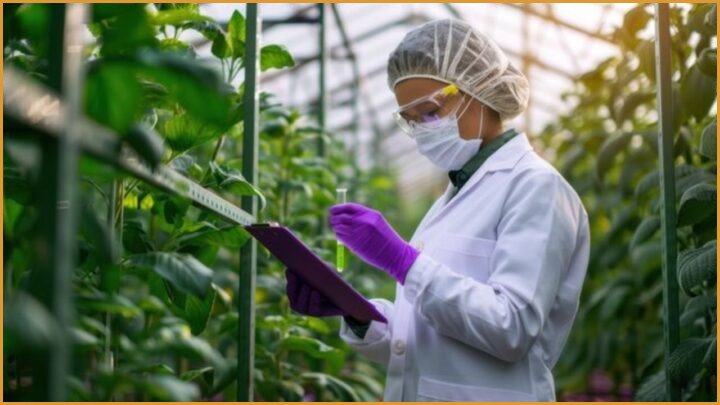Indian Farming Communities – Plant biotechnology has emerged as a game-changer for Indian agriculture, especially in the face of rising climate challenges, unpredictable monsoons, and increasing demand for food. As a science-driven solution, plant biotechnology is enabling farmers to grow more resilient crops, improve yields, and adapt better to environmental stressors like drought, floods, and pests. In a country where over 50% of the population is dependent on agriculture, these innovations are critical for ensuring food security and farmer prosperity.

What Is Plant Biotechnology?
Plant biotechnology involves the use of scientific techniques, including genetic engineering, molecular markers, and tissue culture, to modify plants for desirable traits. This technology helps develop crops that are:
- Resistant to pests and diseases
- Tolerant to extreme weather
- Able to grow in poor soil conditions
- Higher in nutritional value
- Increased in yield potential
Major Techniques in Plant Biotechnology:
- Genetically Modified Organisms (GMOs)
Introduction of specific genes to provide resistance or tolerance. - Tissue Culture and Micropropagation
Rapid production of disease-free planting material. - Marker-Assisted Selection (MAS)
Accelerated breeding using molecular markers to identify desired traits.
Crop Resistance: Combating Pests and Diseases
One of the biggest benefits of plant biotechnology is enhancing crop resistance to pests, diseases, and insects, reducing the need for chemical pesticides.
Case Study: Bt Cotton in India
- Introduced in 2002, Bt Cotton carries a gene from the soil bacterium Bacillus thuringiensis.
- This gene produces a toxin that kills bollworms, a major cotton pest.
- Farmers saw up to 60% reduction in pesticide use and increase in yield by 30–40%.
Bt cotton is now cultivated by over 6 million Indian farmers, proving how biotech can reduce input costs and improve income.

Yield Improvement: Feeding a Growing Population
With India’s population projected to surpass 1.5 billion by 2030, food production must rise significantly. Biotech-enhanced crops produce higher yields per hectare, enabling farmers to feed more people with less land.
Key Achievements:
- Golden Rice: Enriched with Vitamin A to combat malnutrition.
- Drought-tolerant maize and rice: These varieties can survive in water-scarce regions like Rajasthan and Bundelkhand.
- Salt-tolerant rice: Cultivated in coastal areas of Odisha and West Bengal.
Modern plant breeding, combined with biotechnology, has helped increase wheat and rice productivity by over 20% in some regions.
Climate Adaptation: A Lifeline for Farmers
Climate change is no longer a distant threat. Indian farmers now face:
- Unpredictable rainfall
- Frequent floods and droughts
- Shifting growing seasons
- Higher incidence of pests and diseases
Plant biotechnology helps farmers adapt by developing climate-smart crops that can withstand abiotic stresses.
Real-Life Impact:
- Flood-tolerant rice (Swarna-Sub1) has helped farmers in Bihar and Assam reclaim their crop after flood devastation.
- Heat-tolerant wheat varieties are being developed for northern India where temperature spikes are shortening the growing season.
- Drought-resistant chickpeas are boosting production in Maharashtra’s drylands.
These innovations ensure crop survival and reduce losses even under extreme weather, thus stabilizing farmer incomes.
Empowering Indian Farming Communities
Biotechnology is not just about science; it’s about empowering communities. NGOs, Krishi Vigyan Kendras (KVKs), and agri-startups are working with farmers to ensure:
- Training and awareness programs
- Access to biotech seeds and technologies
- Support with government subsidies and credit
- Information on market linkages and fair pricing
Women farmers and smallholders are particularly benefiting from reduced input costs and higher productivity. Biotech crops are easier to manage and require fewer inputs, saving both time and labor.
Comparative Table: Traditional Crops vs Biotech Crops in India
| Feature | Traditional Crops | Biotech-Enhanced Crops |
|---|---|---|
| Pest Resistance | Low | High (e.g., Bt Cotton) |
| Climate Tolerance | Limited | High (Flood, drought, heat) |
| Yield per Hectare | 2-3 tons | 4-6 tons |
| Pesticide Requirement | High | Low to moderate |
| Input Cost | High (due to chemicals) | Lower overall |
| Farmer Income | Unstable | More stable and higher |
| Time to Maturity | Standard | Often shorter (early harvest) |
Challenges and Concerns
Despite the benefits, plant biotechnology faces challenges:
- Regulatory hurdles: India has strict GM crop approval laws.
- Public perception: Many fear “unnatural” food due to lack of awareness.
- Access and affordability: Small farmers may struggle to afford biotech seeds.
- Dependence on companies: Need for open-source biotech solutions to prevent monopolies.
For sustainable success, India needs transparent policy frameworks, strong public research, and awareness campaigns.

The Road Ahead: India’s Bio-Agri Revolution
Plant biotechnology has the potential to transform Indian agriculture into a climate-resilient, high-yielding, and sustainable system. As technologies evolve, India can expect:
- More public-private collaborations
- Expansion of gene-editing tools like CRISPR
- Development of native biotech crops
- Tailored solutions for regional challenges
With the right investment and farmer-centric policies, plant biotech can truly revolutionize Indian farming communities, ensuring food security, rural prosperity, and environmental sustainability.
FAQs on Plant Biotechnology in Indian Agriculture
Q1: Is plant biotechnology safe for consumption?
A: Yes, biotech crops go through rigorous testing and are approved by regulatory authorities before release.
Q2: Why are GM crops controversial in India?
A: Concerns include environmental impact, corporate control, and lack of awareness. Transparency and education are key to resolving these issues.
Q3: Which crops in India currently use biotechnology?
A: Bt Cotton is the only officially approved GM crop in India. Research is ongoing for rice, maize, and mustard.
Q4: How does biotech help with climate change?
A: Biotech crops are designed to tolerate drought, floods, and heat, helping farmers adapt to changing climates.
Q5: Are small farmers benefiting from biotechnology?
A: Yes, especially through higher yields, reduced pesticide costs, and training from NGOs and KVKs. However, access must be further improved.
How is plant biotechnology benefiting Indian farming communities?
By enhancing crop resistance, improving yield, and aiding climate adaptation.






